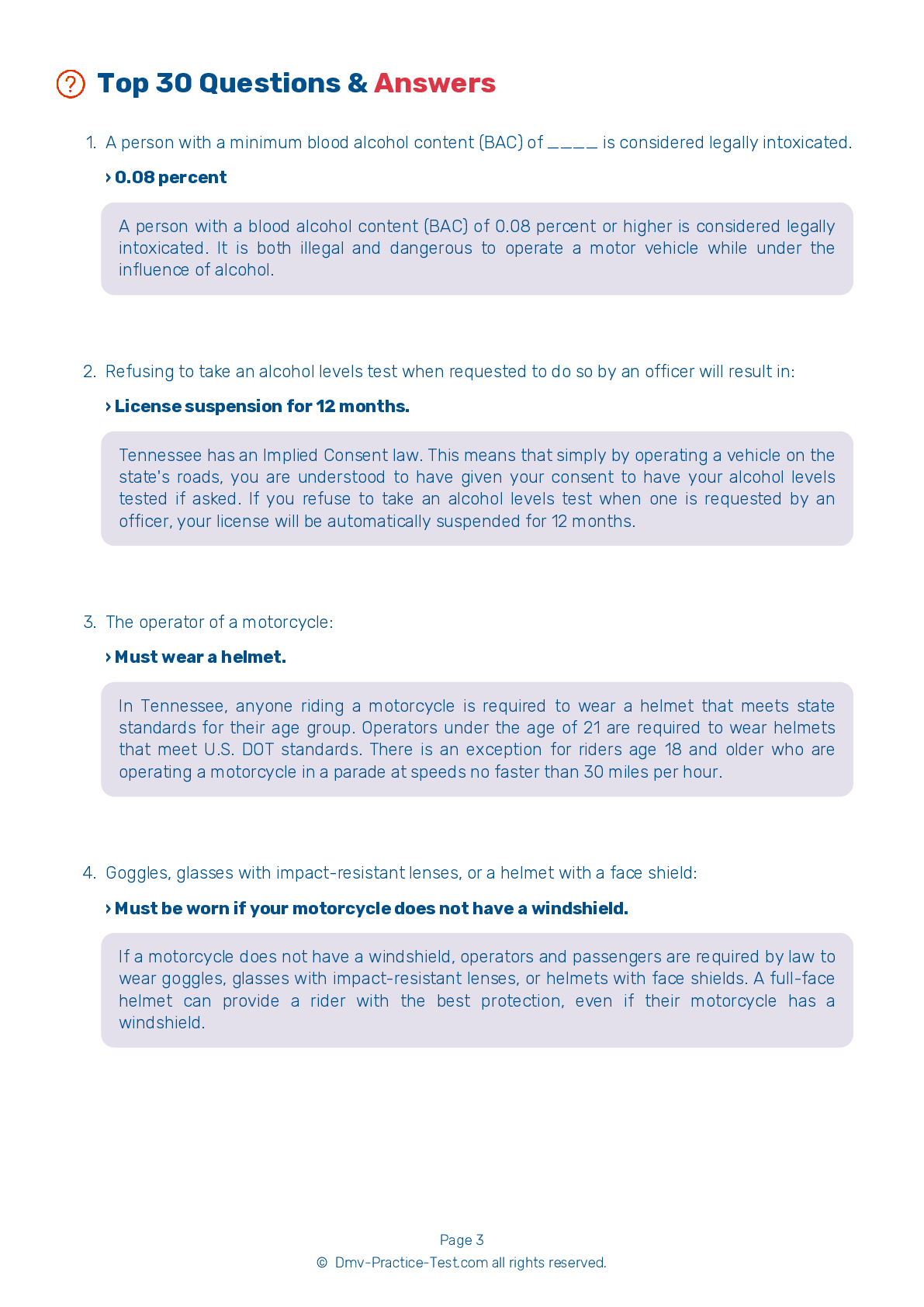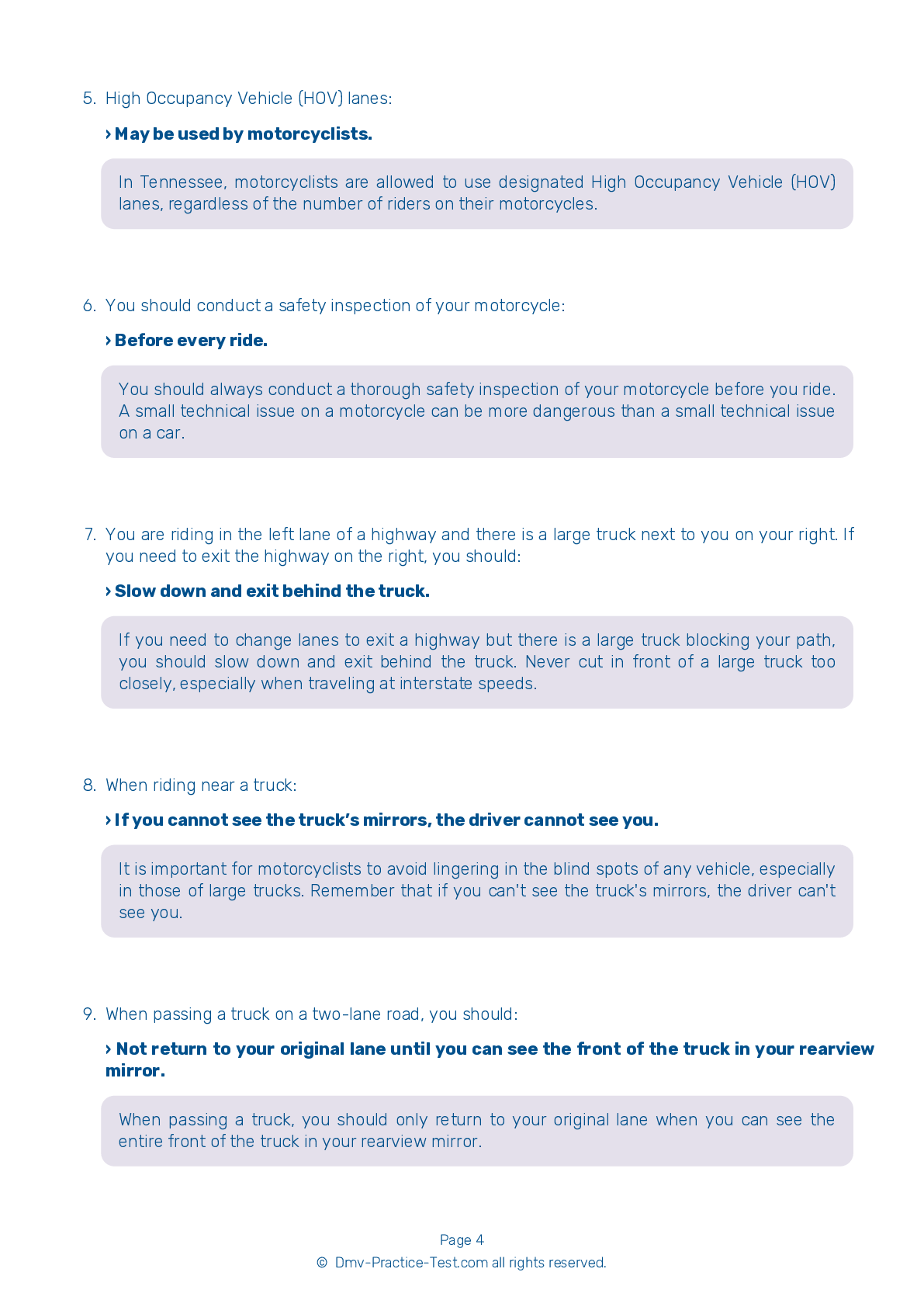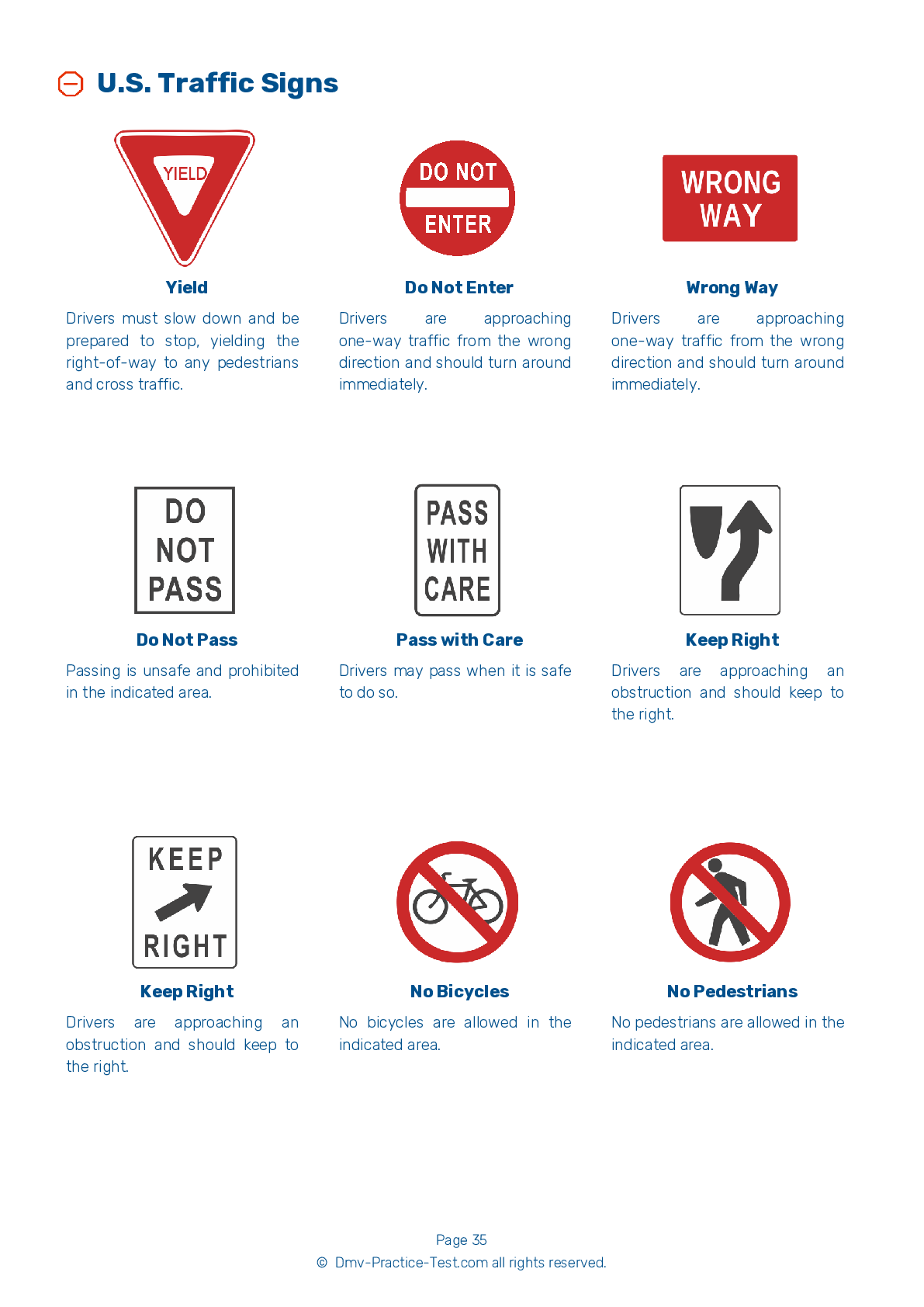DMV Permit Test #11
Motorcycle Test | License TN 2026 | FREE Online Practice! #11 Page 3 of 4
Take this FREE motorcycle test (license in TN 2026) to check your knowledge of the road rules. To improve your results, download a motorcycle handbook online, study theory, and practice for free on our website. Still worried about how to get a motorcycle license in Tennessee in 2026? Check our website for more sample tests, train as much as possible, and boost your grades!
30
24
16
15 . A motorcyclist should attempt to avoid obstacles on the roadway. If avoiding an obstacle is not possible, the motorcyclist should:
If you are unable to avoid an obstacle and must instead ride over it, you should slow down and approach the obstacle at as close to a 90-degree angle as possible.
16 . A flat front tire is especially dangerous because:
A flat front tire is especially dangerous because it interferes with your ability to steer, which is essential to keeping your balance. If steering begins to feel heavy, it is possible that you have a flat front tire.
17 . A person with a minimum blood alcohol content (BAC) of ____ is considered legally intoxicated.
A person with a blood alcohol content (BAC) of 0.08 percent or higher is considered legally intoxicated. It is both illegal and dangerous to operate a motor vehicle while under the influence of alcohol.
18 . If your front wheel locks while you are braking, you should:
If the front wheel locks up while you are braking, release the pressure from the front brake. Immediately re-apply pressure to the brake with controlled gradual pressure.
19 . Pick a lane position that:
Choose a lane position that helps you avoid road hazards. Make sure you maintain a safe cushion of space around your motorcycle at all times.
20 . Which of the following surfaces is unlikely to provide poor traction for motorcyclists?
A number of surfaces can provide poor traction for tires. Wet pavement; roads covered in loose gravel or sand; muddy, snowy, or icy areas; painted lane markings; and metal covers and plates in the road can be more hazardous for a motorcyclist than dry pavement.
21 . When a lead rider's left arm is bent at the elbow with their index finger pointing straight up, it means:
Hand signals are an important part of communication when riding in groups. When the lead rider's left arm is bent at the elbow with their index finger pointing straight up, it means the group should move into a single-file formation.
2026 Tennessee | Frequently Asked Questions
In Tennessee, to acquire a motorcycle driver's license, you must first pass a written test to obtain a motorcycle learner's permit. After 30 days and having practiced driving, you can take a road skills test. Upon passing, you'll receive your motorcycle endorsement. If you're under 18, you must also complete a Motorcycle Rider Education Program.
In Tennessee, the minimum age to obtain a motorcycle driver's license is 16 years old. However, if you're under 18, you'll need to have a valid regular driver's license or learner's permit for at least a year with no traffic violations, and your parent or guardian must sign a consent form. You'll also need to pass the necessary motorcycle written and skills tests.
Yes, you do need a dedicated license for motorcycle riding in Tennessee. You can either add a motorcycle endorsement to your existing Tennessee driver's license or obtain a separate motorcycle-only license. To get these, you must pass a vision screening, knowledge exam, and road skills test specific to motorcycle operation.
When applying for a motorcycle driver's license in Tennessee, you'll need a primary and secondary form of identification such as a birth certificate and social security card. Also, proof of Tennessee residency, U.S. Citizenship or lawful permanent resident status is required. If you're under 18, you'll need a Minor/Teenage Affidavit and Cancellation form signed by your parent or guardian.
Yes, you will need to take a written exam to obtain a motorcycle license in Tennessee. The exam tests your knowledge of motorcycle operation and safety. However, if you successfully complete a Motorcycle Rider Education Program (MREP), you may be exempted from this written test and the on-cycle skills test.
The motorcycle written test in Tennessee covers a range of topics including road rules for motorcycles, safe riding practices, and identifying and reacting to dangerous situations. It also tests knowledge on motorcycle parts, their functions, and maintenance. This information is found in the Tennessee Comprehensive Driver License Manual, specifically in the Motorcycle Operator Manual section.
Yes, in Tennessee, successfully completing a state-approved Motorcycle Rider Education Program (MREP) can waive the written and skills test required for motorcycle licensing. After completion, you'll receive a certificate which you can present at a Driver Services Center within six months to get your motorcycle endorsement.
To enroll in a motorcycle training course in Tennessee, you need to find a state-approved provider, such as a local community college or a private company. Then, register for the course, which typically involves paying a fee. The course usually includes classroom instruction and hands-on training. Upon completion, you may be eligible for license testing waivers or insurance discounts.
No, you don't need to possess your own motorcycle for the license test in Tennessee. You can use any motorcycle that is registered, insured, and meets all state safety standards. However, it's crucial that you're familiar and comfortable with the motorcycle's operations to successfully pass the test.
Yes, you can use a friend's motorcycle for the driver's license test in Tennessee, as long as the motorcycle is properly registered, insured, and passes a safety inspection. Remember to bring proof of insurance and registration to the test. Also, ensure you're familiar with the motorcycle's operation before your test.
Yes, in Tennessee, the motorcycle driving exam tests specific handling skills like starting and stopping, turning and swerving, and quick stops. It also assesses your ability to balance at low speeds, negotiate obstacles, and use both hand and foot controls effectively. Knowledge of traffic rules and safety measures related to motorcycling is also tested.
Yes, in Tennessee, new motorcycle drivers under the age of 18 are subject to restrictions. They must hold a motorcycle learner's permit for a minimum of 180 days, cannot carry passengers, and are prohibited from riding between the hours of 10 p.m. and 4 a.m. These restrictions are lifted once the driver turns 18.
Yes, your Tennessee motorcycle license allows you to operate a motorcycle in other states. However, you must comply with the traffic laws of the state you are in. Make sure to check the specific motorcycle laws of any states you plan to visit, as they may vary.
Yes, in Tennessee, it's mandatory for all motorcycle riders and passengers to wear a helmet. The law applies to any type of motorcycle, including scooters, mopeds, and motorbikes. The helmet must meet federal motor vehicle safety standards and should be equipped with both chin and neck straps.
In Tennessee, there are two types of motorcycle licenses: a "Class M Limited" for 125cc or less motorcycles, and a "Class M" for motorcycles over 125cc. The type of license you apply for depends on the type of motorcycle you plan to drive. Make sure to study the appropriate materials for the type of license you're seeking.
Yes, in Tennessee, you can add supplementary endorsements to your motorcycle license. This can include additional qualifications like a commercial driver's license (CDL). However, each endorsement may require additional tests or fees. It's recommended to consult with the Department of Safety and Homeland Security for specific information.
Yes, in Tennessee, the motorcycle license test can be taken in several languages other than English. However, it's important to contact your local DMV office to confirm which languages are available as this can vary by location. This ensures everyone, regardless of their native language, can understand and complete the test.
An effective strategy for preparing for the Tennessee motorcycle license test is to thoroughly study the Tennessee Motorcycle Operator Manual. This manual covers all the information that will be on the test. Practice tests are also available online to help you familiarize yourself with the format and types of questions asked. Regular review and practice can greatly improve your chances of passing.
Yes, in Tennessee, the motorcycle written exam can be taken in languages other than English. The exam is available in multiple languages to accommodate a diverse range of applicants. However, it's advisable to confirm the available options with your local DMV office as the offered languages may vary.
If you don't pass the motorcycle written test in Tennessee, you're allowed to retake it. However, there is a waiting period of one day before you can retake the test. It's recommended to study the Tennessee Motorcycle Operator Manual thoroughly before attempting again to increase your chances of passing.



